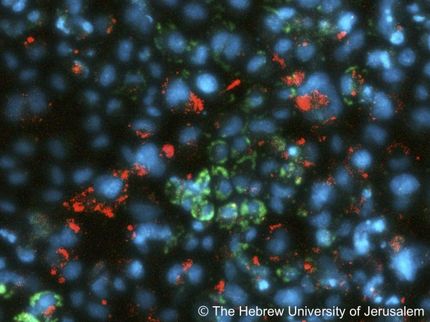Colon cancer screening technique shows continued promise in new study
Recent clinical trials show that a new colon cancer screening technique created by Northwestern University researchers has a high enough sensitivity that it could potentially be as or more successful than a colonoscopy in screening for colon cancer.
The technique uses optical technology, called low-coherence enhanced backscattering (LEBS) spectroscopy, to analyze tissue samples taken from the base of the rectum. Light shines on the tissue, scatters, and some of that light bounces back to sensors in the probe. A computer analyzes the pattern of light scattering, looking for the "fingerprint" of carcinogenesis in the nanoarchitecture of the cells.
Researchers led by Vadim Backman, professor of biomedical engineering at the McCormick School of Engineering and Applied Science, obtained biopsies from patients undergoing colonoscopies and found that LEBS could detect the presence of growths elsewhere in the colon even though it just analyzed tissue from the base of the rectum.
The results were recently published in the journal Cancer Research. Clinical trials have been conducted in collaboration with Hemant Roy, M.D., director of gastroenterology research at NorthShore University HealthSystem.
The study provides a proof of concept that this sort of analysis could be a minimally intrusive colon cancer screening technique. Further studies with a compatible fiber optic probe are under way for multicenter clinical validation.
Most read news
Topics
Organizations
Other news from the department science

Get the analytics and lab tech industry in your inbox
By submitting this form you agree that LUMITOS AG will send you the newsletter(s) selected above by email. Your data will not be passed on to third parties. Your data will be stored and processed in accordance with our data protection regulations. LUMITOS may contact you by email for the purpose of advertising or market and opinion surveys. You can revoke your consent at any time without giving reasons to LUMITOS AG, Ernst-Augustin-Str. 2, 12489 Berlin, Germany or by e-mail at revoke@lumitos.com with effect for the future. In addition, each email contains a link to unsubscribe from the corresponding newsletter.
Most read news
More news from our other portals
See the theme worlds for related content
Topic World Spectroscopy
Investigation with spectroscopy gives us unique insights into the composition and structure of materials. From UV-Vis spectroscopy to infrared and Raman spectroscopy to fluorescence and atomic absorption spectroscopy, spectroscopy offers us a wide range of analytical techniques to precisely characterize substances. Immerse yourself in the fascinating world of spectroscopy!

Topic World Spectroscopy
Investigation with spectroscopy gives us unique insights into the composition and structure of materials. From UV-Vis spectroscopy to infrared and Raman spectroscopy to fluorescence and atomic absorption spectroscopy, spectroscopy offers us a wide range of analytical techniques to precisely characterize substances. Immerse yourself in the fascinating world of spectroscopy!























































